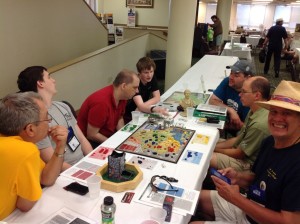
Few teenagers can claim to have been able to reach thousands of people worldwide through their passions, but senior Andrew Ruhnke is about to do just that with the launch of his new board game “Falling Sky.”
The game aims to be a historical simulation of Julius Caesar’s conquest of ancient Gaul, in which players take the roles of different factions in Gaul as they aim to assert their political influence and military dominance over other players.
“It’s part of a niche board gaming genre called wargames, which seeks to create simulations of historical conflicts where players take control of a side and attempt to beat other players,” Ruhnke said. “‘Falling Sky’ is part of GMT Games’ COIN Series of games, which was originally created by my dad and featured modern counterinsurgencies but has expanded to take on many other designers and topics.”
Ruhnke sent out the recently-launched game to a few thousand people worldwide who preordered the game online. The game will also be distributed to be sold in stores.
Ruhnke first found his inspiration for the game in his sophomore English class when he read Caesar’s autobiographical accounts in De Bello Gallico and was finally able to bring the game to fruition after working for hundreds of hours over the past two years.
“Aside from the fact that it was fascinating to read Caesar’s own words, it occurred to me that his conquests of Gaul, with all the multi-faction politics and complex military campaigns would be perfect for the COIN Series, and so the idea for ‘Falling Sky’ was born,” Ruhnke said.
While Ruhnke believes that most people play his game for entertainment, he also sees the potential for an immersive, educational experience.
“It’s not just a board game, but a historical board game, a simulation of real events,” Ruhnke said. “It’s surprising how much you learn when you are engaged and entertained, and are actually actively participating in the process.”
While Ruhnke acknowledges that video games are increasingly gaining market share in the gaming market, he believes that there are certain aspects of playing board games that video games cannot replace.
“A video game can’t match sitting around a table with your friends playing face to face with physical pieces, a real tactile board displayed in front of you, negotiating with and trying to outwit real people sitting next to you rather just an AI script in a computer,” Ruhnke said. “My favorite part is approaching it from a designer’s perspective. There’s a whole new dimension added to the game when it’s of my own creation.”
